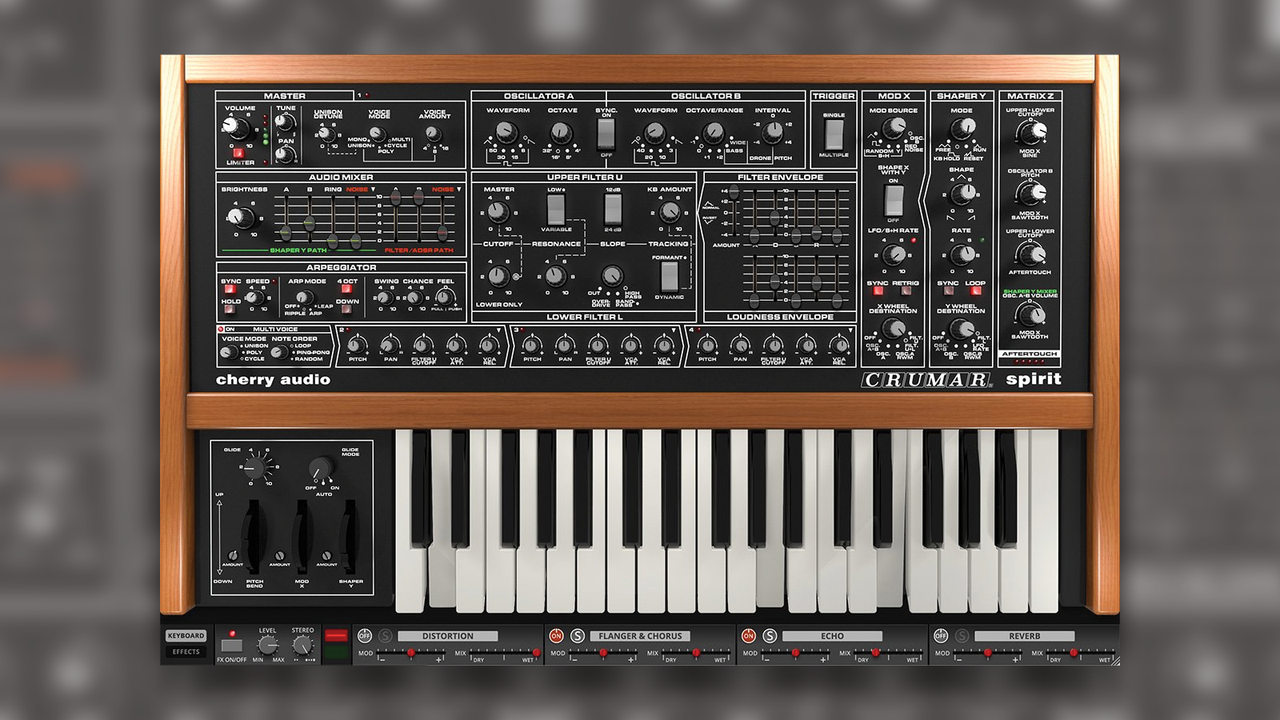
Cherry Audio is renowned for its well-reviewed software recreations of vintage synthesizers, having captured the spirit of legendary names such as the Roland Juno-106, ARP 2600 and Prophet-10 in plugin form, along with some lesser-known instruments like the Novachord.
The latest synth in Cherry Audio's sights is the Crumar Spirit, an Italian analogue monosynth released in 1983 that's considered something of a cult classic. Designed by none other than Bob Moog (in collaboration with Tom Rhea, Jim Scott and Sante Crucianelli) the Spirit is known for its complexity and sonic versatility, along with its ultra-rare status: fewer than 100 units were manufactured before Crumar folded in 1986.
Fast forward to 2008, and the Italian company VMConnection acquired the Crumar brand before relaunching a modernized version of the Spirit in 2023. Cherry Audio's software emulation has been developed in collaboration with Crumar, replicating the innovative design of the original instrument while bringing increased polyphony, enhanced modulation capabilities and a handful of useful new features.
"Spirit is a gateway to sonic experimentation, whether you are after wild, unpredictable timbres or warm, analogue tones" reads a statement from Cherry Audio. "It is not a polite instrument. Nor is it clean, safe, or obvious. However, twist a few knobs and it will reward you with some of the most colorful sounds you have ever heard from a virtual analogue software synthesizer."
Like the original, Cherry Audio's Crumar Spirit is a two-oscillator synth with saw, triangle and square waveforms (the latter with variable pulse width) and its oscillators are somewhat unusually routed through two distinct signal paths.
The first path runs through Spirit's dual resonant filters – one low-pass filter and and a second state-variable filter with high-pass, band-pass and overdrive modes, switchable filter slopes of either 12dB or 24dB and a formant mode for adding vocal-like colour – and its VCA section. The other is routed through a second mixer for blending in ring modulation and a noise generator controlled by Spirit's Shaper Y envelope.
Along with EGs for both filter and amp envelope, Spirit's modulation comes courtesy of two LFOs found in the Mod X and Shaper Y sections, which have been joined in Cherry Audio's software emulation by a new Matrix Z section, a four-slot modulation matrix with 25 sources and 45 destinations.
What else is new? Cherry Audio have upgraded Spirit's multi-mode arpeggiator with swing, humanization and probabilistic sequencing, and introduced a suite of effects that includes distortion, chorus, flanger, delay and reverb.
Voice modes now include monophonic, unison and a cyclic mode that adds per-note variation, along with a polyphonic mode with up to 16 voices, and the synth has been brought into the 21st century with velocity and polyphonic aftertouch.
That might seem like a lot to take in, but we haven't even covered it all: Spirit is an impressively full-featured and versatile instrument, and (in typical Cherry Audio style) is very generously priced at $59. Find out more on Cherry Audio's website.
Spirit is available for macOS and Windows in AU/VST/VST3/AAX formats.







